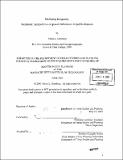| dc.contributor.advisor | Lawrence Susskind. | en_US |
| dc.contributor.author | Gensberg, Alexis L. (Alexis Learn), 1977- | en_US |
| dc.contributor.other | Massachusetts Institute of Technology. Dept. of Urban Studies and Planning. | en_US |
| dc.date.accessioned | 2011-10-17T21:21:43Z | |
| dc.date.available | 2011-10-17T21:21:43Z | |
| dc.date.copyright | 2003 | en_US |
| dc.date.issued | 2003 | en_US |
| dc.identifier.uri | http://hdl.handle.net/1721.1/66400 | |
| dc.description | Thesis (M.C.P.)--Massachusetts Institute of Technology, Dept. of Urban Studies and Planning, 2003. | en_US |
| dc.description | Includes bibliographical references (p. 108-109). | en_US |
| dc.description.abstract | Mediators of public disputes respond to inequalities among parties in a variety of ways. In order to understand the range of interventions they employ and the reasoning behind these interventions, I interviewed 17 experienced public disputes mediators about their individual practice guidelines. I found that mediators' interventions differed substantially when deciding what interests need to be at the table, in providing information to parties on finding technical assistance, and in analyzing emerging agreements. Most mediators interviewed agreed that they should disclose or make obvious to all parties the nature of their contact with an individual party, and that it is inappropriate for them to recommend a specific course of action to a party or a specific solution to the group. In addition, a number of interviewees said that they felt uncomfortable defining the guidelines other mediators should follow. Given this range of responses, I suggest that to better inform parties in a dispute about how the mediator will handle inequalities, it is important that mediators disclose certain approaches before beginning a mediation. The responsibility to disclose can take the place of specific ethical guidelines for public dispute mediators in situations characterized by inequalities. If the mediator responses I found indicate the range of views that exists among public disputes mediators in general, then the field of public disputes mediation is currently too inchoate for a unified set of ethical or practice guidelines to be useful. | en_US |
| dc.description.statementofresponsibility | by Alexis L. Gensberg. | en_US |
| dc.format.extent | 113 p. | en_US |
| dc.language.iso | eng | en_US |
| dc.publisher | Massachusetts Institute of Technology | en_US |
| dc.rights | M.I.T. theses are protected by
copyright. They may be viewed from this source for any purpose, but
reproduction or distribution in any format is prohibited without written
permission. See provided URL for inquiries about permission. | en_US |
| dc.rights.uri | http://dspace.mit.edu/handle/1721.1/7582 | en_US |
| dc.subject | Urban Studies and Planning. | en_US |
| dc.title | Mediating inequality : mediators' perspectives on power imbalances in public disputes | en_US |
| dc.title.alternative | Mediators' perspectives on power imbalances in public disputes | en_US |
| dc.type | Thesis | en_US |
| dc.description.degree | M.C.P. | en_US |
| dc.contributor.department | Massachusetts Institute of Technology. Department of Urban Studies and Planning | |
| dc.identifier.oclc | 52971312 | en_US |
